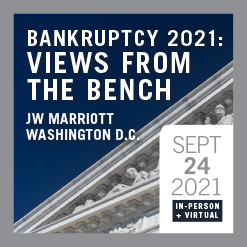| |
| |
| vol 19, num 3 | September 2021 |
| |
|
|
| |
|
|
|
|
|
| |
| None of Your Beeswax: Violations of the Automatic Stay, Voidness and Standing |
|
The childhood riposte “none of your beeswax” has some legal analogs; among them is the doctrine of standing. Standing limits the scope of legal rules, including the automatic stay. Many courts agree that acts in violation of the automatic stay are not voidable but void. If this is true, who may assert that voidness? Whose “beeswax” is an automatic stay violation? In Bank of New York Mellon v. Enchantment at Sunset Bay Condo Ass’n (“Enchantment”), the Ninth Circuit addressed and affirmed a nondebtor’s standing to assert a stay violation where such a violation is void rather than voidable.
|
| |
|
|
|
|
| |
|
| |
| Second Circuit Further Opens Door to Dischargeability for Private Student Loan Borrowers as Call for Student Loan Reform Heats Up |
| In July, the Second Circuit issued an opinion favoring the dischargeability of certain private student loans in what appears to be a growing circuit trend. This trend correlates with the call for student loan reform, which has been at the forefront of the news in recent months.
In Homaidan v. Sallie Mae Inc., the Second Circuit affirmed the bankruptcy court’s denial of lender Navient’s motion to dismiss on the basis that 11 U.S.C. § 523(a)(8)(A)(ii) does not except private student loans from discharge. Debtor Homaidan filed for chapter 7 after graduating from Emerson College, listing private student loans from Navient as liabilities.
|
| |
|
|
|
|
| |
|
| |
| Turnover of Repossessed Property After Fulton: Some Practical Considerations |
| In City of Chicago v. Fulton (Fulton), the Supreme Court settled a split among circuits regarding the correct interpretation of § 362(a)(3), which prohibits “any act to obtain possession of property of the estate or of property from the estate or to exercise control over of property of the estate.” The Court held that mere retention was not an “act” prohibited under § 363(a)(3). The Court’s holding was based on the plain meaning of the statute and the perception that the majority interpretation rendered the turnover statute, § 542, both surplusage and contradictory to § 362(a)(3). Although the case was decided in the
context of cars impounded for unpaid parking tickets by the City of Chicago and the City’s refusal to release the vehicles to the debtors after the filing of chapter 13 petitions, it was considered a victory for secured lenders of personal property, especially vehicles. |
| |
|
|
|
|
| |
|
|
|
|
|
|
|
|
|
| |





